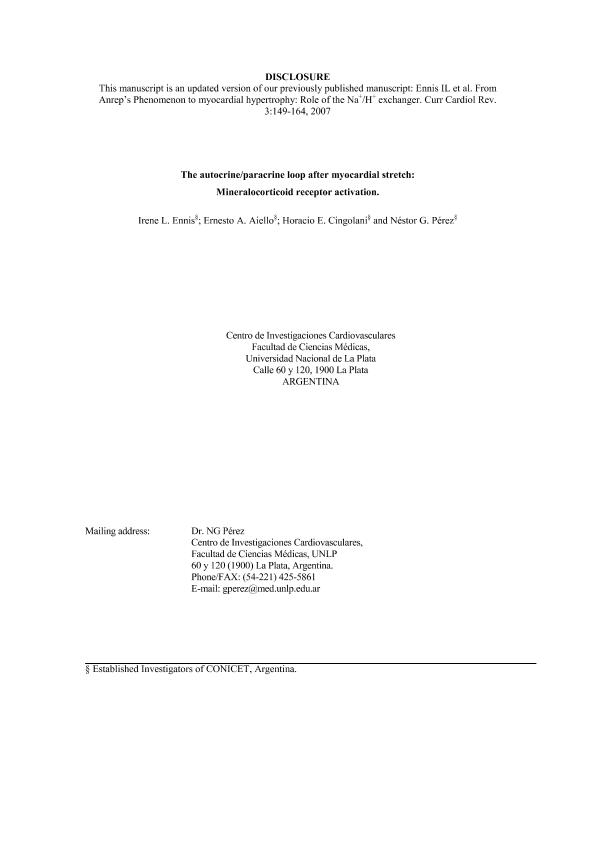Artículo
The autocrine/paracrine loop after myocardial stretch: Mineralocorticoid receptor activation
Fecha de publicación:
01/2013
Editorial:
Bentham Science Publishers
Revista:
Current Cardiology Reviews
ISSN:
1573-403x
e-ISSN:
1875-6557
Idioma:
Inglés
Tipo de recurso:
Artículo publicado
Clasificación temática:
Resumen
The stretch of cardiac muscle increases developed force in two phases. The first phase, which occurs rapidly, constitutes the well-known Frank-Starling mechanism and it is generally attributed to enhanced myofilament responsiveness to Ca2+. The second phase or slow force response (SFR) occurs gradually and is due to an increase in the calcium transient amplitude as a result of a stretch-triggered autocrine/paracrine mechanism. We previously showed that Ca2+ entry through reverse Na+/Ca2+ exchange underlies the SFR, as the final step of an autocrine/paracrine cascade involving release of angiotensin II/endothelin, and a Na+/H+ exchanger (NHE-1) activation-mediated rise in Na+. In the present review we mainly focus on our three latest contributions to the understanding of this signalling pathway triggered by myocardial stretch: 1) The finding that an increased production of reactive oxygen species (ROS) from mitochondrial origin is critical in the activation of the NHE-1 and therefore in the genesis of the SFR; 2) the demonstration of a key role played by the transactivation of the epidermal growth factor receptor; and 3) the involvement of mineralocorticoid receptors (MR) activation in the stretch-triggered cascade leading to the SFR. Among these novel contributions, the critical role played by the MR is perhaps the most important one. This finding may conceivably provide a mechanistic explanation to the recently discovered strikingly beneficial effects of MR antagonism in humans with cardiac hypertrophy and failure.
Archivos asociados
Licencia
Identificadores
Colecciones
Articulos(CIC)
Articulos de CENTRO DE INVEST.CARDIOVASCULARES (I)
Articulos de CENTRO DE INVEST.CARDIOVASCULARES (I)
Citación
Ennis, Irene Lucia; Aiello, Ernesto Alejandro; Cingolani, Horacio Eugenio; Perez, Nestor Gustavo; The autocrine/paracrine loop after myocardial stretch: Mineralocorticoid receptor activation; Bentham Science Publishers; Current Cardiology Reviews; 9; 3; 1-2013; 230-240
Compartir
Altmétricas




